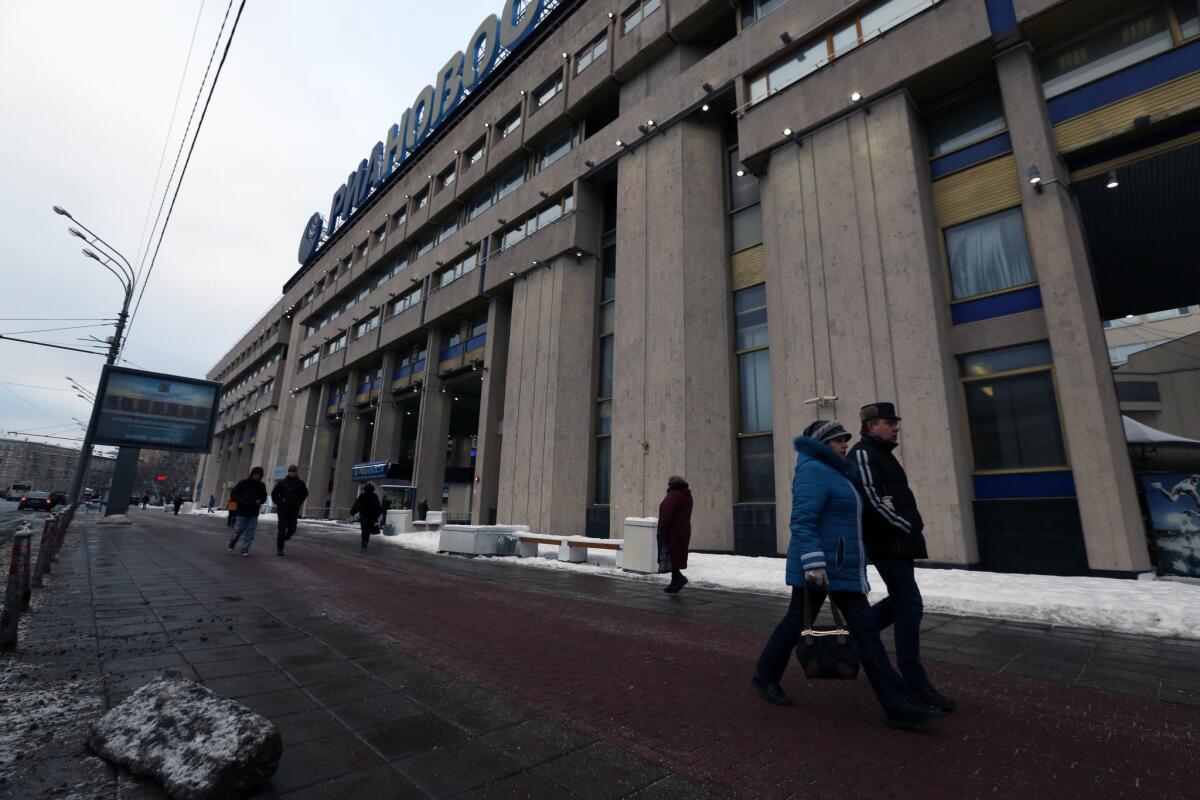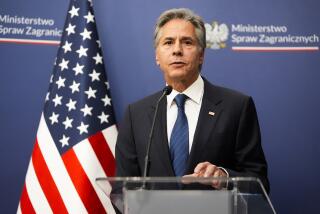Russia: Putin dissolves, replaces Soviet-era news agency

- Share via
MOSCOW -- In what some see as a new move to limit free speech and secure more control over information, Russian President Vladimir Putin on Monday dissolved a state news agency dating to the Soviet era and replaced it with a new body aimed at promoting the Kremlin’s positions abroad.
RIA Novosti, created as the Sovinformburo in June 1941, two days after Adolf Hitler’s Nazi army attacked the Soviet Union, was replaced with a new body called Rossiya Segodnya, or Russia Today.
That is the same name given to an English-language television network, called RT for short, that was launched by the Kremlin several years ago, apparently as a trial balloon to explore ways of transmitting the Russian government’s message abroad.
RIA Novosti employed more than 2,300 people and in recent years had earned a reputation, even among Kremlin critics, as the most outspoken and objective state-owned news outlet. The agency said on its Facebook page that its liquidation would take place over three months and that it would continue operating during that time.
Putin’s chief of staff, Sergei Ivanov, explained the decision to Itar-Tass -- another government-run news agency dating to the Soviet era, albeit one that will remain intact.
“It is not simple to explain to the world that Russia is conducting an independent policy and firmly protects its national interests, but it’s doable and should be done,” he said. “We need to tell the truth, make it accessible to a maximal number of people, using for this purpose a modern tongue and the most advanced technologies.”
Some Russian media analysts hailed the move, saying the new organization would better correspond to Putin’s efforts to reassert Russia’s standing as a superpower. But others lashed out at it as another attempt to encroach upon free speech and serve to distort the reality of modern Russia.
“I am afraid what they intend to build is a new giant propaganda ministry,” Pavel Gusev, editor in chief of the liberal daily Moskovsky Komsomolets and chairman of the Moscow Journalist Union, said in an interview. “In place of RIA Novosti and using its solid base and huge potential, they will most likely not as much inform the public of what is going on as explain news in the light outlined by the authorities.”
Kremlin advisor Sergei Markov argued that the new organization will be more suitable to Putin’s vision of Russia.
“I am sure the new organization will become something we absolutely need today to fortify the soft strength Russia must display abroad these days,” Markov, vice president of Russia’s Plekhanov University of Economics, said in an interview. “We need to clearly show the world that Russia is a great power that can be an ally with the West on some issues but will never be its satellite.”
Employees of RIA Novosti were expected to be offered new jobs, most presumably in the new organization.
In the 1960s through the 1980s, RIA Novosti -- then known as APN -- deployed hundreds of correspondents around the world and allegedly served as journalistic cover for foreign intelligence operations. It was only in the decades that followed the 1991 breakup of the Soviet Union that the organization attained a reputation for quality journalism.
The new organization, Russia Today, will be led by Dmitry Kiselyov, a highly controversial figure who is anchor of a weekly television political news show, Vesti Nedeli, or News of the Week. He is considered an extremely conservative Putin loyalist who has achieved notoriety in part through his intense animosity toward gay people.
Late last year, he said on primetime television that legislation that made it a crime to promote homosexuality to minors didn’t go nearly far enough.
“They should be forbidden to donate blood and sperm,” he said. “And their hearts in case of a [fatal] car accident should be buried in the ground or burnt as unsuitable to generate life.”
Prominent political analyst Andrei Piontkovsky said in an interview that Kiselyov, who will be general manager of Russia Today, was an understandable choice to head the new organization. He noted that Kiselyov was known as a liberal when Russia was led by the late President Boris Yeltsin, who allowed an unfettered press.
Kiselyov “has changed his views since then, exactly in tune with the radical changes of the state’s ideology,” said Piontkovsky, director of the Russian Academy of Sciences’ System Analysis Institute, a Moscow-based think tank. “Putin loves the aggressive way in which Kiselyov has been presenting the Kremlin’s positions for Russian audiences, and he must be thinking that Kiselyov will be as successful abroad.”
ALSO:
India’s ruling party takes drubbing in state elections
North Korean ouster could bring more political turmoil
Israel’s Benjamin Netanyahu to skip Mandela memorial, citing cost
More to Read
Sign up for Essential California
The most important California stories and recommendations in your inbox every morning.
You may occasionally receive promotional content from the Los Angeles Times.










